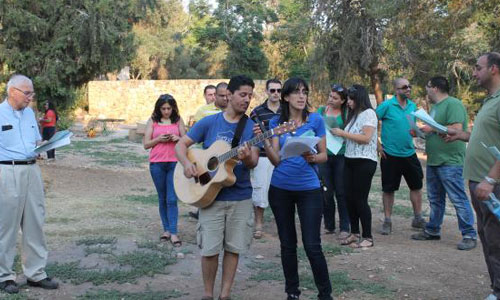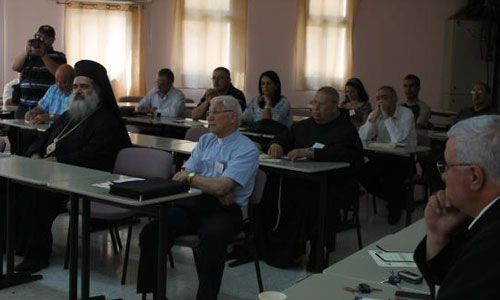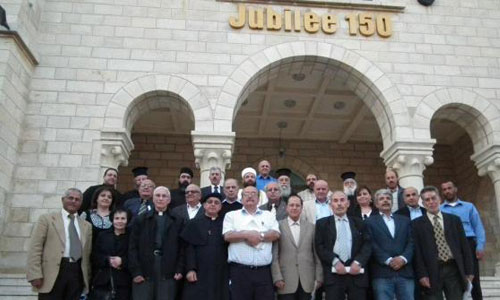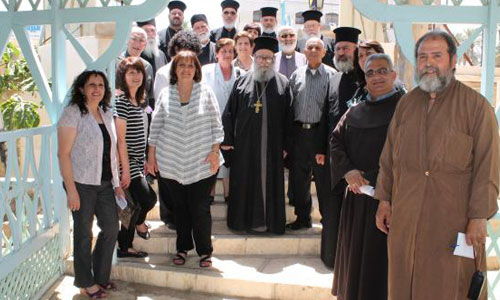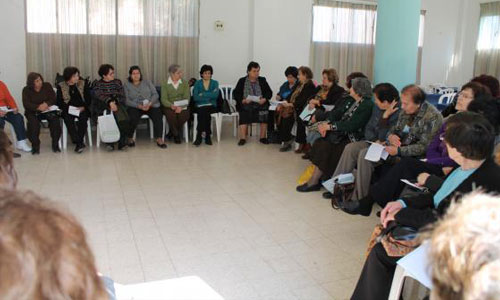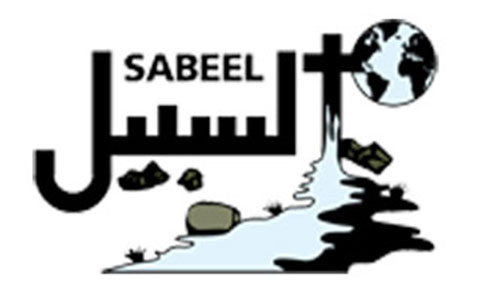
The Jewish Community Relations Council of San Francisco, recently involved in censoring an exhibit of Gaza children’s art in Oakland, has now turned its sights on two Northern California conferences concerning Israel/Palestine. These events, scheduled to take place next month in Sunnyvale and Sacramento, are sponsored by Friends of Sabeel-North America and follow on two highly successful Sabeel conferences held in 2007 in Berkeley and 2010 in San Anselmo.
Sabeel is a Palestinian Christian group calling for equality and justice in Israel/Palestine through non-violent efforts. Its work is ecumenical and interfaith, and its founder, Rev. Naim Ateek, an Anglican pastor, has become the primary focus of JCRC attacks. In recent weeks, JCRC has sent letters to churches throughout Northern California charging Ateek with using “abandoned anti-Semitic Christian theologies” and urging pastors to withhold support from the conferences.
Now the Rev. Ateek, at the urging of Sabeel’s colleagues in Jewish Voice for Peace, has responded to the JCRC attacks.
By Rev. Dr. Naim Stifan Ateek
Two accusations have been leveled against me. The first claims that I said, “Judaism is tribal; Christianity is universal. Judaism is wrong and was superseded by Christianity.” The second claims that I said, “Jews killed Jesus.”
What did I actually say about tribalism and Judaism? When I discuss the question of tribalism vs. universalism, I am talking about the lively debate within the Hebrew Scriptures (the Old Testament, to Christians). There was a dynamic debate in these scriptures that moved religious thought from exclusivity to inclusivity, and this phenomenon pre-dated the coming of Jesus Christ by several hundred years. It was not a Christian vs. Jewish construction.
I point out the genius of the Hebrew prophets in understanding God as an inclusive God. These prophets see God as the God who cares not only about the Israelites, but also about other people and other lands. You can find this inclusiveness in the Psalms: “The earth is the Lord’s and all that is in it, the world, and those who live in it.” In this view, no matter where one lives, one is still in the presence of God.
It is important to point out that Judaism, as it developed, was not superseded by the Christian faith but continued as a living and valid faith worthy of our full respect. Today, this faith is distorted by the exclusive reading of extremist settlers who say, “We are interested in divine rights and not in human rights.” They are selectively reading certain biblical texts that give Jewish people a higher and prior claim to the land and negate the right of the Palestinians. Such a theology does not lend itself to peace. We choose biblical texts that promote peace for all, and many of these are found in the Hebrew Bible.
JCRC accuses me of saying that the “Jews killed Jesus,” but I never use the word “Jews” in that context. I said that Jesus suffered “at the hands of evil political and religious powers two thousand years ago.” This is a careful and precise statement. In all of my preaching on this topic, I have never singled out Jews as killers of Jesus. I always refer to the Roman authorities in collusion with religious leaders.
Likewise, my words that relate the events of the crucifixion to modern reality are clear and specific. I place the responsibility on the Israeli government. There is no mention of “the state of Israel.” My words do not delegitimize the state, which is made up of the Israeli people. They critique the “government of Israel” and its policies, which constitute the greatest obstacles to peace.
I do not believe it is right for me or for any Christian to refrain from using the crucifixion imagery that is part of the essence of our faith and is deeply meaningful for our worship and spirituality. This imagery genuinely informs our involvement on behalf of the oppressed everywhere in the world, and Israel-Palestine is no exception. I believe I need to use the imagery whenever it is appropriate and at the same time oppose anyone who abuses it by invoking it against Jews today.
The imagery of the cross as an instrument of cruelty, torture, and suffering preceded Jesus’ crucifixion. When I use this imagery, I am using it in the way Jesus, a Jewish Semitic man, used it. I am not using it in a novel, anti-Semitic way.
Gustavo Gutierrez, the Latin American theologian, used a picture of the crucifix for the cover of his book on liberation theology. He could not find any better image to express the suffering of his people. To my knowledge, no one has called him anti-Semitic or accused him of using Christ-killer imagery. We can also point to Jewish artist Marc Chagall’s paintings of the cross. To him the crucifixion of Jesus symbolized the martyrdom of Jews everywhere.
It is important for everyone to be exact and careful when speaking about Palestine and Israel, but it is wrong to construe every attack against the government of Israel as an attack on Jews or Judaism. There are people who want to silence any criticism of Israel, and they force the impression that the state of Israel, the government of Israel, Jews, Judaism, Israelis, Zionists, and Zionism are all synonymous terms and an attack on one is an attack on all. This is wrong and dangerous. Israel is a state like any other. When it governs justly, it should be commended. When it does not, it needs to be confronted and challenged.
Racism, prejudice and discrimination still exist in the world, and the Jews have endured the longest continuous manifestation of this racism. I have written that we, as Palestinians, should face Israel candidly and say that we are appalled by the Holocaust, that we should open our hearts “and with a new, magnanimous attitude we should say to the Jews, ‘We will accept you and share the land with you. You have suffered for so long. Come share our land. This is God’s land. We will live in it together as brothers and sisters.’”
I write this response in a spirit of humility and passion to see a just and lasting peace in our land and in every place where oppression and injustice dominate life.
